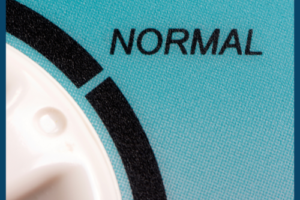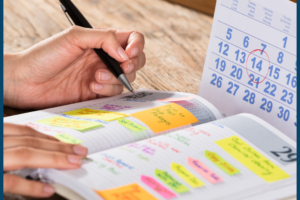
3 Tactics to Reduce Overwhelm During a Medical Event
Raise your hand if people would describe you as a driven, ambitious person.
Although you can’t see it, I’m raising my hand.
This is why it’s a bit out of character that I haven’t posted new blog content since March 15th. While my wonderful virtual assistant, Kim, has posted on LinkedIn and Facebook on my behalf, between March 27th and May 5th, I was on LinkedIn for about 15 minutes, and didn’t check Facebook at all.
I haven’t been on vacation, nor did I deliberately decide to take a break from social media.
Instead, a life event threw me a curve ball: left knee replacement. This was unexpected because just seven months prior I’d been told that it would be five-to-ten years before I’d need the left knee replaced.
This is my sixth major surgery since April, 2017. People who know me will tell you that I go back to work as soon as possible after an operation. No, I don’t always meet with clients right away, yet I’ve started doing work-related items within a few days. Even when surgery made it difficult for me to type, I still managed to write content, plan, etc.
So when this knee replacement was scheduled, I assumed that things would follow a similar pattern.
How wrong I was!
Not only did I take lots of naps, I dropped all my morning and evening routines. I didn’t even manage my non-negotiables! I had no appetite at all and I had to make myself eat at least a little, since I knew it was crucial to my recovery. If I had a brief burst of energy during the day, I’d quickly check email and pay bills. Even reading, an activity I normally really enjoy, fell by the wayside.
Why am I sharing this?
Because like me, you might be thrown a health-related curve-ball, and I hope that some of what I learned during these six weeks might be useful for you.
ACCEPT. As much as I wanted everything to be like my previous post-operation experiences, it wasn’t. I couldn’t force myself to resume my regular routines. My body just couldn’t. I had to accept that things were different this time, even if my mind chatter was telling me to “just start doing tasks and the energy will eventually kick in“.
I realized that doing basic adulting tasks, like paying bills, was all I could manage.
Similarly, there are other medical conditions that impact your ability to continue your regular routines. It might be for a defined length of time, such as with cancer or a broken bone. Or it could be long-term, if you have lupus, rheumatoid arthritis, or a traumatic brain injury.
Accepting that there will be changes is the first step towards optimizing your life after a medical diagnosis.
RELEASE. The more time that went by when I couldn’t carry out my responsibilities, the more my inside clutter yelled, “Tasks and projects are stacking up! Things are falling through the cracks left and right. You’ll never get caught up!”
While this was true, there was literally nothing I could do about it! So, for the first time that I can remember, rather than beating myself up about it, I let it go. I ACCEPTED that some tasks would be postponed and others would be eliminated all together.
The need to release (delay, delegate, delete) duties is an important part of managing the overwhelm associated with a health-based situation.
EVALUATE. I finally went to see my internist on May 10th. After following her instructions, I regained my energy and ability to eat in two days. Happy dance!
At the same time, I knew that I needed to determine the best way to proceed. Otherwise, I would jump in with both feet and start doing everything that hadn’t been done the previous six weeks. This would only drain my energy and hamper my recovery.
So I made time to prioritize.
First, I restarted one of my morning and evening non-negotiable routines. I’ll add the others slowly over time. Second, I assessed my professional tasks and projects. There were many since I hadn’t done anything for six weeks! Before I even began to weigh their importance, I gave myself permission to work fewer hours than usual. After all, I’m still recovering, which includes physical therapy appointments and at-home exercises. Then I considered which activities would make the biggest impact. Third, although I’d kept up with paying bills, I considered whether there were other high priority personal obligations.
Simultaneously, I’m considering whether to make any permanent changes to my schedule as a result of what I’d learned during my forced “time-off”. I’m basically restarting my routines, so it’s a great time to consider whether changing any of my habits would be beneficial.
Making time to evaluate how things are going in your personal and professional life is a useful exercise anytime life feels out of control!
As someone reminded me, during the six weeks, I was practicing what I preach in terms of self-care. Part of this was giving myself permission to concentrate on my recovery instead of beating myself up for all the things I wasn’t doing.
My clients appreciate it when I “give them permission” to do or not to do something. It’s just something that I’m not so good at giving to myself.😊
What do you need to give yourself permission to do (or not to do) today?
Let me know below; I’d love to cheer you on!



